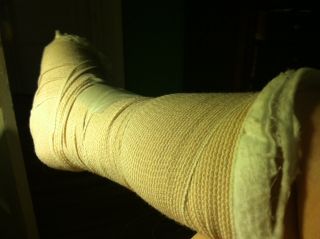
Nearly two months ago, I had surgery on my toe. I expected to wake up in a walking boot, but instead I found a cast up to my knee. The surgeon said my bones were weaker than he'd like and he wanted to be conservative about healing. The cast came off after three weeks, replaced by an enormous boot that I still couldn't bear weight on. After six weeks on crutches I was finally allowed to wear a post-op shoe and begin to put some weight on the foot. My poor husband had to drive me around, help me shower, and do everything around the house.
Why am I telling you all this? Because I was also unable to exercise for those six weeks. My normal fitness routine involves riding the stationary bike at the gym, or riding outdoors, or hiking briskly, four or five times a week, plus lifting some weights and stretching. I'm hardly a fanatic, and I knew I'd be stiff and out of shape at the end of those six weeks. What I didn't anticipate was how much my mental health would be affected.
By week four I was solidly depressed--lethargic, gloomy, having trouble sleeping. By week five I was crying most days (I'm normally not much of a crier). By week six I could barely get out of bed. If the doctor hadn't cleared me for some weight bearing I don't know what I would have done.
It's been about a week and a half now and I'm easing back into some kind of exercise routine again. This morning, for instance, I rode intervals on the bike at the gym. At a very low level, and not super fast. But I worked up a good sweat and got my heart rate up. And I think you can see from the photo what kind of mood I was experiencing.
I'm fascinated and disturbed by how the conversation about weight bounces between extremes. Either you're dieting/watching what you eat/eating clean and spending hours a week getting toned, buff, and fit, or you're sitting on the couch eating bon-bons and canceling your gym membership. No lie--that's how people actually frame this conversation. If you're not trying to get thin you must be a lazy slob--that's the rhetoric.
The real story, of course, is far more complex and individual. When people ask me about my new book they often assume I'm suggesting we all cancel our gym memberships and lie around on the couch. When I tell them I'm a huge proponent of physical activity they're often shocked. And disbelieving.
So this is a little reminder that physical activity doesn't belong only to the thin or the wannabe-thin people. It's good for everyone no matter what your weight or size or physical limitations. If you can't bike maybe you can dance. If you can't dance maybe you can walk. If you can't walk maybe you can swim. If you can't swim maybe you can wave your arms to some music you like. What you do doesn't matter, so long as you do something.
Along the way, you might lose some weight. You might gain some weight. You will likely gain some muscle. The number on the scale might stay exactly the same. But you can be confident that you're doing something that will definitely improve your health.


